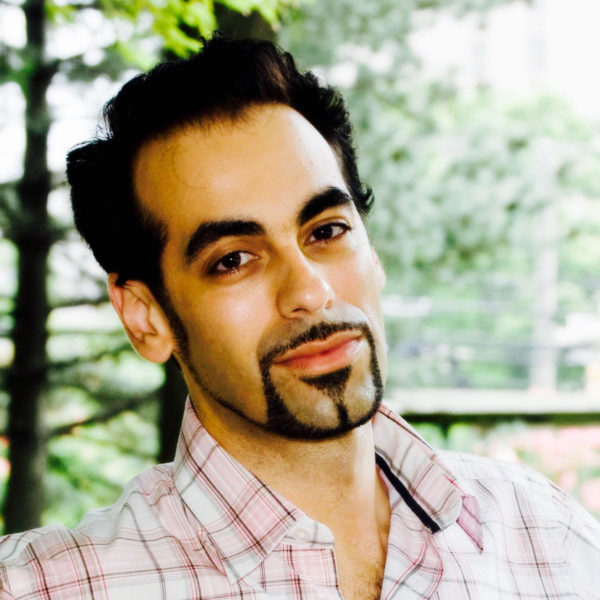
Image by GraceOda/Flickr, Some Rights Reserved.
In Embracing, We Let Go
It is a fairly remarkable thing to put out into the world a book of nearly 23 years of marveling, questing, and helplessly confessing, in verse. Seeing the figures “1993-2015” on the cover of the volume is a little like contemplating my own tombstone. “Here lies a life, in Poetry.”
It is humbling and bewildering to meditate upon over two decades of being and becoming. As Yevgeny Yevtushenko puts it:
“A poet’s autobiography is his poetry. Anything else is just a footnote.”
With this metaphorical tombstone, and the closing of a book on several chapters of one’s life, comes the liberating and enticing possibility of rebirth. Here is a poem that hints at this new life:
“Arrivals”
by Yahia LababidiI don’t quite know how it occurred
that this great fish has appeared
almost fully formed, it seemed
to crowd out all else in my aquariumPerhaps, this creature of the depths
always was, just out of sight
secretly feeding on hidden longing
and now demands acknowledgingWith the swish of a majestic tail
it’s upset my incidental decor—
gone the rubber diver and plastic treasure.
The glass frame itself can’t be far behind…
Growing up in Egypt, a predominantly Muslim culture, I instinctively rebelled against what I perceived as a hypocritical religiosity, and took refuge in what might be described as philosophical literature. This entailed throwing out the luminous baby (faith) with the murky (cultural) bathwater. But worshipping at the altar of the mind, I found I was becoming one of its chew toys and that doubt and cynicism, however clever or seductively presented, were diminishing, and, ultimately, a dead end.
I came late to a certain type of love poetry — songs of adoration, ecstasy, and surrender addressed to the Divine. To quote Rumi, who spoke of the limitations of poetry when he had become a celebrated poet:
“What, after all, is my concern with poetry? In comparison with the true Reality, I have no time for poetry. It is the only nutrition that my visitors can accept, so like a good host I provide it.”
Which is to say that, only a few years ago, at the end of my fourth decade, a bundle of slim volumes (mostly Persian treatises and poetry composed several centuries years ago) had begun to work their quiet magic on me. A small window appeared to be opening within, or a veil lifting, onto a vast, previously unimagined vista. And I came to realize, in humility and awe, that after decades of intellectual exploration, I still stood on the shore — before an immeasurable sea.

Mysteriously, as I attempted to slake this aching thirst with lives and utterances of mystics of all stripes (Taoist, Buddhist, Christian…) I found I was also returning home, in a sense. For the first time in decades I, a recovering existentialist, found myself able to slip through the back door of a much-maligned, widely misunderstood religion I thought I’d left behind: Islam.
Led on by abiding longing, I crawled again and again to Sufism for succor, sustenance, and inspiration. To paraphrase Rumi, I let myself be silently drawn by the strange pull of what I love, and it did not lead me astray. In blindly trusting this way, I came to realize that books, persons, circumstances all can be employed as mouths or arms, to address us and draw us closer. Mysticism is a courtship.
Living in the U.S. at this particular historical moment, when there is mounting suspicion and murderous ignorance in regards to the “Arab/Muslim world,” I’ve grown to feel a responsibility for my writing to serve as a kind of bridge, a peace offering, tending to our shared humanity.
Prose can do that, by tackling misconceptions directly, but poetry does it by attempting to tell the truth slant and to bear witness to our spiritual condition. Poetry, as I’ve come to understand it, is a form of prayer, praising, upward-reaching, and glad, within wing’s wind of a great song:
“Ah, to be one of them! One of the poets whose song helps close the wound rather than open it!”
— Juan Ramón Jiménez
Another poem attempts to sing the ineffable:
“Embracing, We Let Go”
by Yahia LababidiPerhaps, we are negotiating
not just with one, but always two
-who share the same soil, it is true-
one who lives, another who is dyingA shift in balance begins to take place
once a love of silence is confessed
its roots run deep, its shade a world
and her fruits impossible to forgetFrom the first, we surrender something
and, gradually, consent to be emptied
transfixed by so much soundless music
drunk and sated through lipless mouthsWhat use to name this silent master
preparing us for dying or the Divine
(I’m not sure there is a difference)
but know in embracing, we let go.
“Arrivals” and “Embracing, We Let Go” are excerpted with permission from Yahia Lababidi’s collection of poetry, Balancing Acts: New & Selected Poems 1993 – 2015. For more poetry, visit our Poetry Radio Project.

